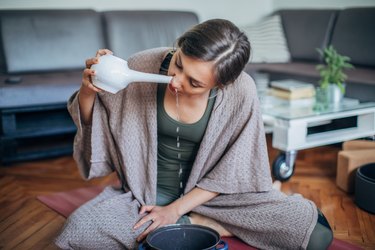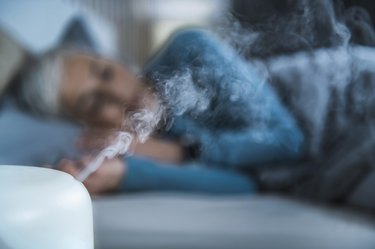
Nose gunk in general isn't fun, but when it drips down the back of your throat? Yuck.
Post-nasal drip is the secretions from mucus originating from the back of your nasal passages, David Erstein, MD, a board-certified allergist and immunologist working with Advanced Dermatology PC in New York City, tells LIVESTRONG.com.
Video of the Day
Video of the Day
Fun fact: The glands in your nose and throat produce one or two quarts of mucus per day, notes the American Academy of Otolaryngology-Head and Neck Surgery Foundation. And that mucus plays an important role in your health, keeping your nasal lining clean and moist and stopping infection. Post-nasal drip can occur as a result of allergies, acid reflux, sinusitis or a viral infection like a cold or flu.
You might have post-nasal drip if you, well, feel mucus dripping in the back of your throat, find yourself swallowing or clearing your throat often or have a sore throat, the Foundation points out. It may also taste pretty gross, too.
While there are medications that can help, it's best to try non-drug treatments first, Dr. Erstein says. Over-the-counter meds are generally safe, but they come with a risk of side effects and can interact with other meds you might be on.
Here's where to start to stop post-nasal drip:
1. Try Nasal Irrigation

Nasal saline (salt water) sprays and saline rinse kits are effective, non-medication treatments for post-nasal drip, Dr. Erstein says. These are available as squeeze bottles and sprays, and some people like to use neti pots (small containers usually shaped like a teapot that are designed to rinse out your nose).
If you do use a neti pot, use distilled or sterile water; tap water is not safe to use in your nasal passages, per the U.S. Food & Drug Administration.
2. Drink Water
Filling your glass with more H2O is never a bad idea, and it's even more important when you're dealing with too much mucus.
"Make sure you are hydrated to thin out the secretions," Dr. Erstein says.
Plus, you'll wash away any yucky taste, too.
3. Sleep Propped Up
When laying down, mucus can collect at the back of your throat, making you cough (and probably disturbing your sleep).
To stop post-nasal drip from waking you up, put an extra pillow under your head, which will help gravity usher down the drip while you snooze.
4. Run a Humidifier at Night

Dry air irritates sinuses and can cause your body to ramp up mucus production. To counter that, upping the humidity in your room while you sleep can help clear your nasal passages.
If you use a humidifier, though, make sure to clean the filter as recommended by the manufacturer to prevent mold growth, something that can make breathing more difficult, especially if you have allergies, according to the American Academy of Allergy, Asthma & Immunology.
5. Consider Medications for Post-Nasal Drip
If things like saline rinses, drinking water, sleeping more upright and running a humidifier don't work, then you can turn to a medication for short-term relief, Dr. Erstein says.
Options include:
- Decongestants such as pseudoephedrine (Sudafed), which relieve congestion and decrease excess mucus
- Mucinex to thin and loosen mucus
- Nasal decongestants like Afrin
- Antihistamines
Talk to your doctor about what's right for you. For example, people who have high blood pressure are usually told to avoid decongestants (because these narrow blood vessels), Dr. Erstein says. And nasal decongestants like Afrin should not be used for more than three days, because prolonged use can worsen congestion.
Related Reading
When to See a Doctor for Post-Nasal Drip
Post-nasal drip is annoying at best, but it can also really affect how you feel during the day — especially if you have other symptoms that go along with it.
"Unrelenting symptoms affecting quality of life are a sign that it's time to see a doctor," Dr. Erstein says.
Post-nasal drip may be from a viral infection that will clear up after it's run its course. However, if it's chronic, your doctor may want to evaluate you for underlying reasons for the post-nasal drip, like allergies or acid reflux, and then come up with an appropriate treatment plan.
Is this an emergency? If you are experiencing serious medical symptoms, please see the National Library of Medicine’s list of signs you need emergency medical attention or call 911.